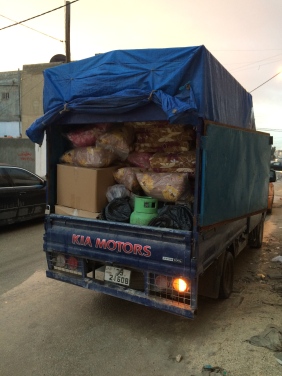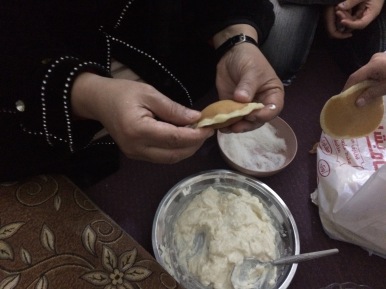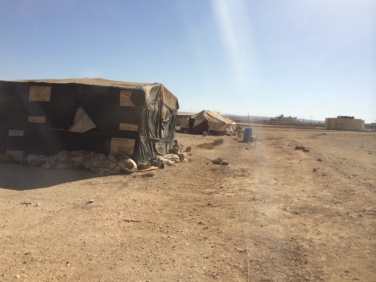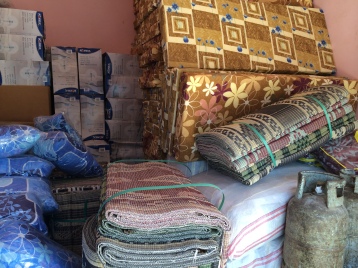“Do you think we’ve visited long enough?” she asked me, quietly. Flashed across my friend’s forehead was a wrinkle of concern. I blinked back my surprise.
Full two hours earlier:
Nine-year-old Hamza sprinted down the bannister-free stairs and into her arms. “Miss Joanne! Miss Joanne!” His exuberance was equivalent to a winning goal-scorer in a World Cup finals match.
He seized her hand, leading his teacher– and me– proudly up to the second-story apartment (amidst her, “Be careful, Hamza– you don’t want to break your arm again on these stairs”), pausing at its broken-concrete threshold so we could slip off our shoes. We entered in to kisses from mother, warm welcome from father, shy hello from sister.
Before we could sip the first cup of sweet tea, Hamza– from his position of love and honor at Joanne’s side– asked what they would be doing in school tomorrow. “You have two more WEEKS of vacation,” Joanne laughed.
Hamza grinned. “So what are we doing in two weeks?”
Last year, in a community center just a few hours away from my basement apartment, an informal “school” began with Joanne and three other teachers. They provide free education to 30 displaced children, whose families dwell in apartments across this border town; the concrete of these homes is cold in the winter. But it is better than the tents of the refugee camps, where most of them started out. The war not only removed people from their native lands but also ravaged routines, like going to school. So Joanne’s second-grade class includes students as old as 12.
Others have no place to go. One mother arrived at the center on “registration day,” seeking help for her household, which included her 15- and 16-year-old daughters. I asked if they were able to attend a school. “They have not been in school for a year and a half– since we left home.” She suddenly began to weep. “Their future is gone.”
Just like I witnessed last summer, local leaders still fill trucks with mattresses, blankets, gas bottles, stoves, and now heaters. Then they empty them, little by little, into the homes of the displaced.
 One of the leaders, Baha, asked me to come with him for “distribution.” Culturally, men should try to avoid going by themselves to a female-headed home (culturally, Baha also felt that as a woman i should not lift anything heavier than a blanket into the truck… but that’s a second story). Many of those who registered for help, like the woman with the teenage daughters, have homes that fit this description; the husbands either remain in war-torn areas, or are dead. So with another volunteer– to guard the truck while we were inside peoples’ houses– we headed out.
One of the leaders, Baha, asked me to come with him for “distribution.” Culturally, men should try to avoid going by themselves to a female-headed home (culturally, Baha also felt that as a woman i should not lift anything heavier than a blanket into the truck… but that’s a second story). Many of those who registered for help, like the woman with the teenage daughters, have homes that fit this description; the husbands either remain in war-torn areas, or are dead. So with another volunteer– to guard the truck while we were inside peoples’ houses– we headed out.
Since the temperatures had lowered in December, the sense of urgency had heightened. During distribution, whenever we finished emptying a little bit of relief into one family’s home, several new families would gather around Baha to voice their requests.
Their cries would become more urgent, and their bodies press closer, as he climbed into the truck. “Baha!” “Baha!” I understood more of their stories than I had last summer: descriptions of the coldness of houses; urgent requests for Pampers or pills or preference over others already registered; reports of the number of children they had at home, in need…
Once in the cab, Baha did the opposite of my expectation: he rolled down the window.
He listened to each of them. He recorded their needs and phone numbers in a notebook. And he sang to himself as we drove away, mentally preparing to do it all over again at the next house… as he has been doing for four years.
Back at Hamza’s house, I tried to reassure Joanne that we had visited long enough. She is hoping to see each of her students during school vacation. But she knows that most families are not allowed to work; that they are separated from their relational networks; and that presence, that listening, matters.
So she takes her time.
How do you stay full inside when emptying yourself, over and over, into an ocean of want? How do you listen when the stories pound like waves, individual surges of the same substance, over and over, threatening to wear down or drag under?
Hamza’s mother re-entered with a bag of spongey, pancake-shaped bread. Half an hour more. She filled a dish with thick cream and sugar. Then she showed Joanne and me how to put a spoonful of filling in the middle of each pancake, crimping the edges by pressing them together. “You have to seal it completely,” she cautioned us.

My word for this year is “full.” A week up by the border, and I am reminded that the only way to stay full is to press in deeply.
Because as I learned making this dessert… if you don’t fully press in, all you make is a mess.

